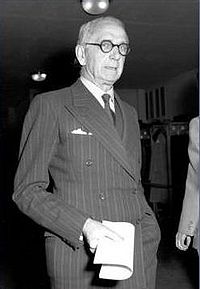Vous pouvez contribuer simplement à Wikibéral. Pour cela, demandez un compte à adminwiki@liberaux.org. N'hésitez pas !
Walter Layton
| Walter Layton | |||||
| Économiste, journaliste | |||||
|---|---|---|---|---|---|
| Dates | 1884-1966 | ||||

| |||||
| Tendance | Libéral classique | ||||
| Nationalité | |||||
| Articles internes | Autres articles sur Walter Layton | ||||
| Citation | |||||
| Interwikis sur Walter Layton | |||||
Walter Thomas Layton, 1er baron Layton, né le 15 mars 1884 et mort le 14 février 1966, était un économiste et homme de presse britannique.
Présentation
Il étudie à King's College School, puis à Westminster City School, University College, London et Trinity College, Cambridge.
En 1908, il intègre le corps professoral de Trinity College, cotoyant Arthur Cecil Pigou et John Maynard Keynes. Puis, de 1909 à 1915, le Gonville and Caius College à Cambridge là encore. Il enseigne à University College London entre 1909 et 1912. Cette année-là il publie Introduction to the theory of prices qui rencontre un certain écho. Ses travaux sont alors proches des idées d'[[Alfred Marshall] dont il a suivi les cours à Cambridge.
En 1910, il épouse Eleanor Dorothea Osmaston.
Remarqué en tant qu'économiste, il travaille au ministère des Munitions pendant la Première Guerre mondiale. En 1917, on lui décerne l'Order of the British Empire (CBE) et il est fait Companion of Honour en 1919.
En 1922, il devient rédacteur en chef du journal The Economist, poste qu'il occupera jusqu'en 1938. En 1928, il devient propriétaire du journal. Entre 1944 et 1963 il en est également le président. En tant que rédacteur en chef, il impulse un nouveau souffle au journal et maintient strictement l'indépendance de sa ligne éditoriale. Il se retire en octobre 1938 alors que Neville Chamberlain choisit d'apaiser Adolf Hitler à Munich.
Il écrit alors dans sa tribune d'adieux le 22 octobre 1938 :
- « Recent events have left us face to face with a grim and menacing world. The lamp of freedom is burning very low in Europe. Those who share our idea of the things that make life worth while, who dream of a tolerant world in which men can come and go freely, can think for themselves, can count on decent behaviour from their neighbours and have a chance to make their own way, have had their hopes badly shattered. The prestige of the democracies is at a low ebb; the idea of might is in the ascendant; every small nation looks to the future with fear in its heart. We have to brace ourselves for a struggle of wills, for a great conflict of ideas and for a test of character and endurance.
- […] The spirit of liberty is not dead in Europe. But it has been temporarily hypnotised, by mass suggestion and by reiterations of the voice from the microphone, in a state of coma. It will slowly revive if there is an interval of peace and if the nations which are still free communities can show that they are as efficient and as courageous as those which have surrendered to dictatorships… »
À partir de 1930, il devient également directeur éditorial du News Chronicle et de The Star.
Intellectuel engagé, il était membre du Parti libéral britannique et brigua à trois reprises un siège de député dans la circonscription de Burnley en 1922, de Cardiff South en 1923, et de la London University en 1929. De 1952 à 1955, il est également vice-président du groupe des libéraux à la chambre des Lords.
Cependant, cette influence politique fut minime par rapport à l'influence qu'il exerça au sein de l'intelligentsia libérale de l'époque et sur l'opinion publique par ses chroniques.
Lors de la Seconde Guerre mondiale, il est à nouveau appelé par le gouvernement pour travailler sur l'approvisionnement militaire. Il travaille au sein du ministère de l'Approvisionnement et du ministère de la Production.
Il est élevé à la pairie en tant que Baron Layton en 1947. Il avait été anobli dès 1930 (knighted).
Entre 1949 et 1957, il est vice-président du conseil de l'Europe.
Il meurt le 14 février 1966, à 81 ans. Les archives de sa correspondance et de ses discours sont conservées à Trinity College.
Ouvrages
- 1912, An introduction to the study of prices, MacMillan
- Traduction japonaise en 1940,
- The relations of capital and labour
- 1939, Allied war aims : a plan for European peace
- 1944, The British Commonwealth and world order,
- discours tenu le 3 mars 1944
- 1944, How to deal with Germany : a plan for European peace
- 1945, préface de The White Cliffs par Alice Duer Miller
- 1961, Dorothy, Collins
Bibliographie
- Hubback, David. No Ordinary Press Baron: A Life of Walter Layton, Weidenfeld & Nicolson, 1985, ISBN 0297784722
- Grayson, Richard S. Walter Layton in Brack & Randall (eds.) The Dictionary of Liberal Thought, Politico's Publishing, 2007 pp206-208
- Grayson, Richard S. Walter Thomas Layton in Oxford Dictionary of National Biography OUP, 2004-09
- Kidd, Charles, Williamson, David (editors). Debrett's Peerage and Baronetage (1990 edition). New York: St Martin's Press, 1990.
- Layton, Christopher. Walter Layton (Lord Layton) in Brack et al (eds.) Dictionary of Liberal Biography, Politico's Publishing 1998 pp217-219
- Oxbury, Harold. Great Britons: Twentieth Century Lives. Oxford University Press, 1984.
| Accédez d'un seul coup d’œil au portail sur l'histoire du libéralisme et de la liberté. |
| Accédez d'un seul coup d’œil au portail économie. |